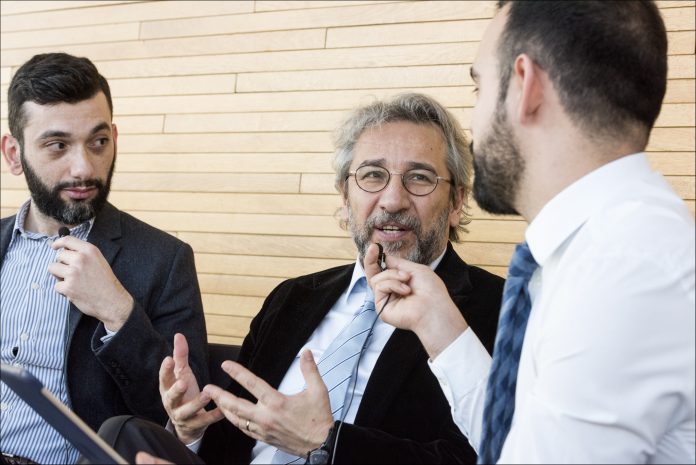Turkey is in an evident crisis of the of rule of law. In fact, the judiciary has never been fully independent and impartial but in recent years it has apparently become a tool in the hand of the ruling power. With this tool, the Erdogan government, allying with the infamous ultra-nationalist factions, suppresses its dissidents regardless of which social group they belong to. Although it is often argued by the government that the enemies they fight is terrorist organizations, many peaceful dissidents like Osman Kavala and Taner Kilic are now in prison charged with various baseless accusations. Given that the definition of terror is very much vague in the Turkish Criminal Code which has long been an obstacle to opening of new chapters in the EU participation process, the government’s argument becomes seldom persuasive.
Erdogan’s greed for power has turned into a need for absolute power after the Gezi protests and corruption scandals in 2013. He came to understand that he must guarantee the life-long ruling status in order to protect himself from being impeached and even being sentenced by a court. Not only the corruption probes targeting members of his cabinet and family members but also the investigation on the illegal armed transfer to radical groups in Syria made him feel that the judiciary must be under absolute control of him. With this logic, he allied with the notorious ultra-nationalist factions within the state to eliminate his dissidents especially the alleged Gulen followers.
Dogu Perincek, a prominent figure of the ultra-nationalists, said in a TV debate that the judiciary is the dog of the politics. This expression is very much suitable to show the nature of the Erdogan-Ultra-nationalists alliance. On one hand, a politician who feels that he can’t take losing the power and on the other hand, a group that has lost its power because of legal investigations on their alleged illegal plans and practices. Aiming at controlling the judiciary is a politically correct strategy for the survival of the two. However, success of the alliance obviously means much more sufferings for the society as the recent case of Sahin Alpay and Mehmet Altan.
The Turkish Constitutional Court has decided that the arrest of veteran journalists Sahin Alpay and Mehmet Altan should end. This decision raised hope for many other journalists who are currently behind bars yet a weird backlash came from the local court refusing to implement the decision. Istanbul’s 13th Criminal Court announced that the Constitutional Court’s decision is null because it exceeded its authority. Immediately after, the PM Yildirim and Deputy PM Bozdag spoke to endorse the decision of the local court. Already suffering from heavy oppression provided by the State of Emergency conditions, Turkey has been caught by another turbulence.
Earlier in February 2016, the Constitutional Court has decided that arrest of two other prominent journalists, Can Dundar and Erdem Gul, must end. Then, the local court has obeyed the Supreme Court’s order and released the two. Erdogan was not happy with this decision and he publicly declared his anger at the Court by saying “I don’t respect the Court’s decision”. Despite his harsh reaction the judiciary has released the journalists. Erdogan has taken his lesson from that decision and, on the pretext of the failed of 15 July 2016, he started his post-coup witch hunt with the judiciary even before the military. The day after the coup attempt, thousands of non-loyal judges have been dismissed and arrest warrants for them have been issued based on profiling lists which were obviously prepared long before the incident. All critical posts in the judiciary, like in the other state offices, have been replaced by loyalists. The most salient example of the loyalty of the judiciary to Erdogan is Mehmet Yimaz, the deputy chairman of the Council of Judges and Prosecutors. He publicly apologized to Erdogan for being late to decide on dismissal of two judges who released 63 police officers involved the corruption probes against the government. Connecting the dots, the judiciary has indeed become the dog of the politics.
As mentioned above, Turkey’s judiciary has never been fully independent even before the Erdogan era but today the mechanism of the judiciary is prone to disappear. In an interview, Sebnem Korur Fincanci, the head of The Turkey Human Rights Foundation (TIHV) warns that Turkey has turned in to fascism by making the judicial mechanisms totally obsolete. She says “In different times since the mid-1970s, there was oppression in different issues. There were unsolved murders which were actually conducted by the state. There were murders in torture and enforced disappearances. Yet we could use different mechanisms to pursue our rights. This mechanism was the judiciary. Then this was the state of norms. That was important because we could pursue our rights. Today, we have a state mechanism that restricts our capacity to pursue rights. The state is totally built upon measures. That is why I say that the oppression is even heavier than the past now”. In line with her argument, one can say that the only criterion for the judiciary now is to please or protect Erdogan.
The European response, however, against Erdogan’s pressure on the judiciary is not consistent. While Many EU politicians strongly criticize his autocratic use of power on the media, few of them have raised the terrible situation of the arrested and dismissed judges. Even the European Court of the Human Rights has not so far given a decision on their situation except a couple of refusal which is rumored that the Court cherrypicked the files that were inadequately prepared. It is obviously very much encouraging for Erdogan to keep pressuring on the judges.
Dr Ugur Tok is the Director of Platform for Peace and Justice in Brussels, http://www.

